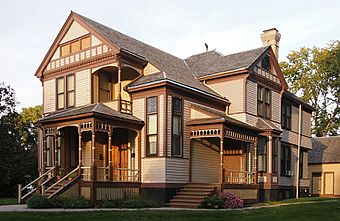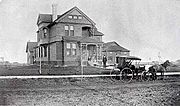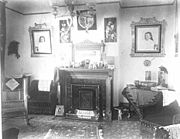Comstock House facts for kids
Quick facts for kids |
|
|
Solomon Gilman Comstock House
|
|

The Comstock House viewed from the southwest
|
|
| Location | 506 8th Street South, Moorhead, Minnesota |
|---|---|
| Area | 0.5 acres (0.20 ha) |
| Built | 1882–3 |
| Architect | Kees & Fisk |
| Architectural style | Queen Anne/Eastlake |
| MPS | Clay County MRA |
| NRHP reference No. | 74001011 |
| Designated | December 30, 1974 |
The Comstock House is a special historic home in Moorhead, Minnesota. It was built for Solomon Comstock and his family. Construction happened between 1882 and 1883. The house shows a mix of two popular styles from that time: Queen Anne and Eastlake.
Solomon Comstock (1842–1933) was one of the first people to settle in Moorhead. He was very important in helping the city grow. He was involved in business, politics, and education. Today, the Comstock House is a historic house museum. It is managed by the Minnesota Historical Society and the Historical and Cultural Society of Clay County. The house was added to the National Register of Historic Places in 1974. It is recognized for its beautiful architecture and for Solomon Comstock's role in Moorhead's history.
Contents
Building a New Home
Solomon Comstock first came to Moorhead in 1871. He arrived with the Northern Pacific Railway. Before that, he had worked as a lawyer. Within ten years, he became the first Clay County Attorney. He also served as a Minnesota senator. Comstock owned a large land company. He was a business partner with James J. Hill, a famous railroad builder.
Why a New Location?
The Comstock family first lived near the Red River. But two big floods in 1880 and 1881 caused problems. Solomon decided to move his family to a safer place. He wanted to build a large house. This new home would protect his growing family from floods. It would also be far from the busy saloon district in Moorhead. He found the perfect spot in the Highlands area of Moorhead.
Designing the House
Comstock chose an architecture firm from Minneapolis. The firm was called Kees & Fisk. They designed the house using a mix of Queen Anne and Eastlake styles. The house had eleven rooms. The property also had other buildings. These included a carriage house and an ice house. The ice house was taken down in the late 1950s. Comstock wanted to support local businesses. So, he hired contractors from the Fargo–Moorhead area.
Solomon Comstock was very involved in building his home. He personally chose the different types of wood used. He wanted only the best materials. His contract with the builders said they had to use "best available materials." If they didn't, they would have to replace them at their own cost.
A Center for Community
The Comstocks were important people in Moorhead. Their house often hosted many community groups. Sarah Comstock, Solomon's wife, was a leader. She was the first president of the Moorhead Public Library Board. Before the library building was finished in 1906, board meetings happened at the Comstock dining room table. The Moorhead Women's Club also met at the Comstock House. Sarah was a founding member of this club.
The House as a Museum
The Comstock House stayed with the Comstock family until 1965. George Comstock and his wife Frances Frazier Comstock gave it to the Minnesota Historical Society (MNHS). In 1974, the house was added to the National Register of Historic Places. A group called the Comstock House Historical Society was formed. Their goal was to make the house look like it did in 1883. After six years of raising money, the house opened for public tours in 1980.
Restoring Its Beauty
A big renovation project started in 1988. Kendra Dillard, an MNHS employee, created a plan for furnishing the house. Staff hired experts to replace wallpaper. They also installed new carpets. Two chairs were reupholstered, meaning their fabric was replaced. A lot of research helped guide this work. Dillard found the original fabric for the chairs. She worked with a company in Boston to make an exact copy.
Who Manages the House?
In 2004, the City of Moorhead signed a contract. They agreed to manage the daily operations of the Comstock House for the Minnesota Historical Society. This continued until 2015. The house then closed for a year. This was for a lead paint removal project. After reopening in 2016, the Historical and Cultural Society of Clay County took over management.
See also





